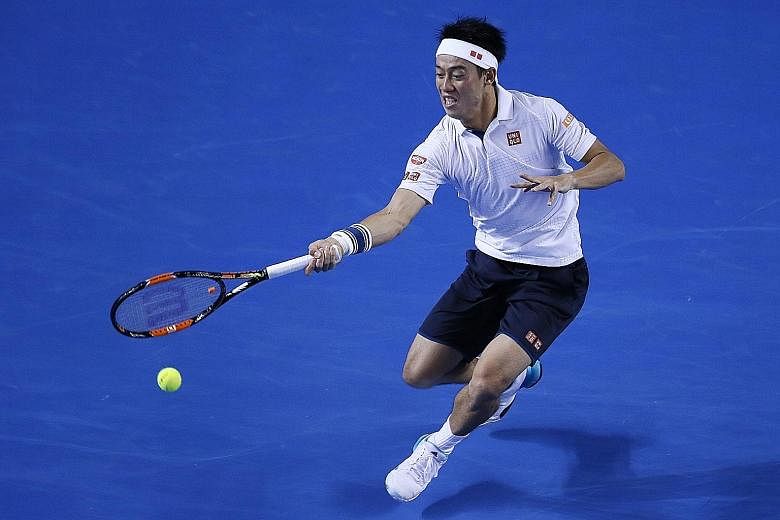The staggeringly difficult can sound utterly uncomplicated: Hey, fellows, want to win a Slam, then just elevate your game. Today, then tomorrow, then the day after. Just keep changing to a higher gear. Kiss the lines. Lift your level as every round passes. Just be better, against better players, on command.
Yet it's uncommonly hard to keep finding your better game. Even Novak Djokovic can lose his, as he did yesterday, but he still won because his "C" game is the equivalent to most people's "A". But most others can't afford a twinge in the back or a hiccup on the serve or an accumulation of unforced errors. The further they go in a Slam, the far greater the cost of a slightly errant day.
In Melbourne, Jo-Wilfried Tsonga had beaten the world No. 46, the No. 310 and the No. 167. Nice, steady work. Yet the man across the net from him yesterday was the world No. 7. Japan's rising one. To beat Kei Nishikori, Tsonga simply had to be better and he wasn't. He may look a little like Muhammad Ali but he was throwing flawed combinations.
Maybe Tsonga "did a few wrong choices" or served too many double faults (eight), but by just after lunch he was probably at the cashier getting paid and then at the airport going home. In sport the loser is forgotten instantaneously. One moment people discuss your prospects animatedly, next moment you no longer belong in the conversation.
Nishikori is still here, a fellow who skates across court in sneakers and beat Tsonga 6-4, 6-2, 6-4 yesterday because he was better. "Today was I think one of the best match I had this week," he said. "Played good tennis, through three sets."
Twice before these men have played in Slams, twice before they've gone five sets, but yesterday, on a wet day, Tsonga's gunpowder went damp and Nishikori's groundstrokes, especially his 16 winners on the forehand, crackled like pistol shots.
Notionally this battle seemed unequal. The Japanese is 10cm shorter, 15.8kg lighter and his fastest serve, 198kmh was only 4kmh quicker than Tsonga's average first-serve speed. Yet Nishikori won because the son of a Japanese engineer understood a simple equation: Patience plus belligerence plus consistency equals brilliance.
He won 60 per cent of baseline points, hit more winners (31 to 28), had fewer unforced errors (25 to 36) and broke five times to Tsonga's once. His seamless play so rattled Tsonga - whose back required mid-match treatment - that the Frenchman at one point was waiting to receive serve at the wrong side of the court.
These men, the Frenchman, 30, the Japanese, 26, are fascinating because they exist in tennis' secondary level even while trying to promote themselves to the first. They are appealing, entertaining, skilful players but stuck in that place called "almost great". They've both won tour titles, both beaten Roger Federer, Rafael Nadal, Novak Djokovic and Andy Murray, both been to a Grand Slam final (Tsonga, Australia 2008; Nishikori, US 2014) but both haven't taken the next step. They're on the cusp of a breakthrough which frustratingly refuses to come.
But what does the athlete do? He pushes on, he waits for the next stop, the next city, the next chance. Tsonga lost but was last seen exiting the press conference shrugging on his jacket and a smile. Nishikori won but rationed his grins possibly because he knew his prize for this win is a public meeting with Djokovic tomorrow.
Nishikori doesn't look like he is content being a piece of tennis exotica - first Asian to reach a Grand Slam final. It's not such labels he craves but the title itself. To do that here he must oust Djokovic, who owns five Australian Open trophies but was famously conquered by Nishikori in the semi-finals of the US Open in 2014. It is a moment the Japanese hasn't forgotten and a match he occasionally replays.
"Yeah, I do watch it sometimes when I want some confidence. I'm sure try to watch again before next match." Of course, since that New York meeting, Djokovic has beaten Nishikori four straight times, including a 6-1,6-1 chastising in London late last year. As the Japanese admitted: "He kind of destroy me."
Nishikori will arrive on court tomorrow, followed one presumes by his face-painted, flag-waving, politely-shrieking faithful. It will take an army it seems to defeat Djokovic these days. The Serb peaks at almost every Grand Slam and elevates - as he eventually did last evening against Gilles Simon - in big matches. One might say he is tennis' greatest climber. His unique pressure is to be the best on every day of the year. But Nishikori, only for this one day, has to be better.


